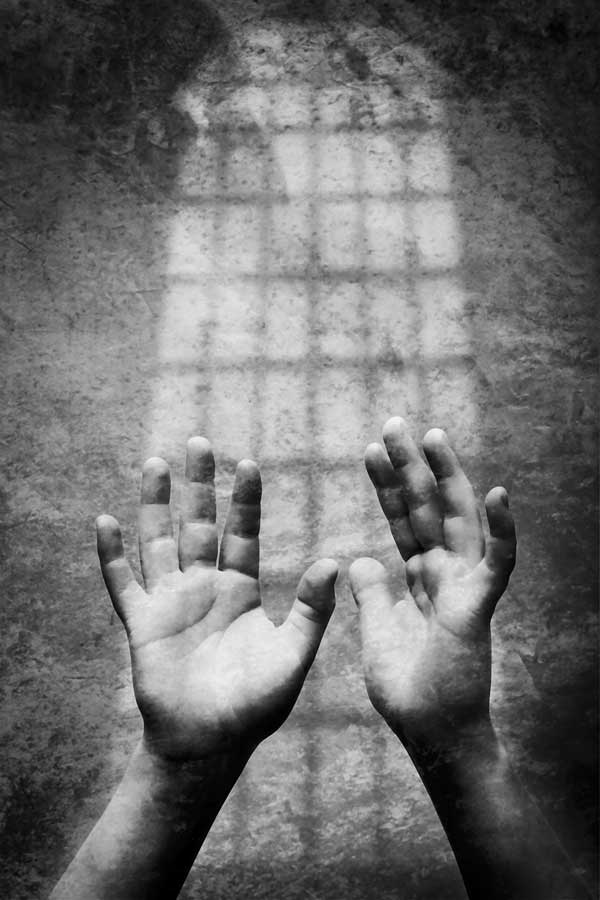A Prayer and Fasting Devotional
 The crowd joined in attacking them, and the magistrates tore the garments off them and gave orders to beat them with rods. And when they had inflicted many blows upon them, they threw them into prison, ordering the jailer to keep them safely. Having received this order, he put them into the inner prison and fastened their feet in the stocks.
The crowd joined in attacking them, and the magistrates tore the garments off them and gave orders to beat them with rods. And when they had inflicted many blows upon them, they threw them into prison, ordering the jailer to keep them safely. Having received this order, he put them into the inner prison and fastened their feet in the stocks.About midnight Paul and Silas were praying and singing hymns to God, and the prisoners were listening to them, and suddenly there was a great earthquake, so that the foundations of the prison were shaken. And immediately all the doors were opened, and everyone's bonds were unfastened. - Acts 16:22-26
We often marvel at the faith of the early church. In the midst of brutal persecution, we watch our forbearers remain bold and steadfast. If you’re like me, you probably wonder at the source of their great faith. Is their perseverance primarily the result of their temporal proximity to the events of Jesus’ life, death and resurrection? If so, that source remains obviously and disappointingly distant from modern believers. However, as we examine the lives of these early Christians I believe a different answer emerges. An answer that remains close at hand for us; one that I hope will provide fresh encouragement as you seek God during this season.
We enter this passage at a moment when Paul’s message and ministry have once more rattled the status quo. Paul – having been led by a very specific vision of a man of Macedonia – has very recently landed in Philippi. He and his new traveling companion, Silas, have been jailed after an incident involving the exorcism of a slave girl and the furious reaction of her owners. Paul and Silas are beaten and thrown into the innermost part of the prison. They are immobilized as the jailer “fastened their feet in the stocks” (v. 24). This is Paul and Silas’ first imprisonment together and the first time they’ve bled alongside one another. We might expect them to be sobered by the moment, contemplating if they’d ever get out of this jail or what may await them if they continue on their journey. We might imagine Silas turning to Paul and questioning the validity of his vision of the man of Macedonia. “Did God really say …” would have been a reasonable inquiry from Silas.
Instead, “about midnight Paul and Silas were praying and singing hymns to God and the prisoners were listening to them” (v. 25). Paul and Silas neither question God nor do they shake their fists at Him. They are in the ancient equivalent of solitary confinement, and yet the entire prison can hear them singing. In a moment of great trial, Paul and Silas are praising God at the top of their lungs. We may wonder about the source of Paul and Silas’ faith in this moment. What gave them the strength to praise God in spite of their fear and suffering? It seems we may have that question the wrong way around. Paul and Silas worship God precisely because of their fear and the suffering of the moment. The strength is drawn from, not preceded by their prayer and worship. Consider the words of the Psalmist:
Psalm 103:1-6: “Bless the LORD, O my soul, and all that is within me, bless his holy name! Bless the LORD, O my soul, and forget not all his benefits, who forgives all your iniquity, who heals all your diseases, who redeems your life from the pit, who crowns you with steadfast love and mercy, who satisfies you with good so that your youth is renewed like the eagle's. The LORD works righteousness and justice for all who are oppressed.”
In this Psalm we’re actually encouraged to speak to our own selves and call forth worship. We can wrongly believe that worship is only appropriate when it “naturally” rises up within us. One mistaken argument can go: unless we believe, feel and perfectly live out everything we’re singing, we sing in vain. This Psalm and, I believe, the example of Paul and Silas suggest otherwise. Our worship – even through gritted teeth or even as we’re trembling in a jail cell – can often stir up the very faith we’re lacking. In worship, apathy can transform into deep passion, doubt into heartfelt trust and fear into confidence.
Therefore, in this season of fasting don’t neglect the power of worship. I’d encourage you not to wait until you feel like worshipping but rather to follow the example of the saints of old by speaking to your own soul even now. You may just find that the strength you’re lacking –whether physically or spiritually – arises from, rather than precedes, your worship.
Scott Jones
Learn more about the 40 Day Initiative >
Resources on prayer and fasting >
See who else has signed up, so you can be encouraged and pray for them >





